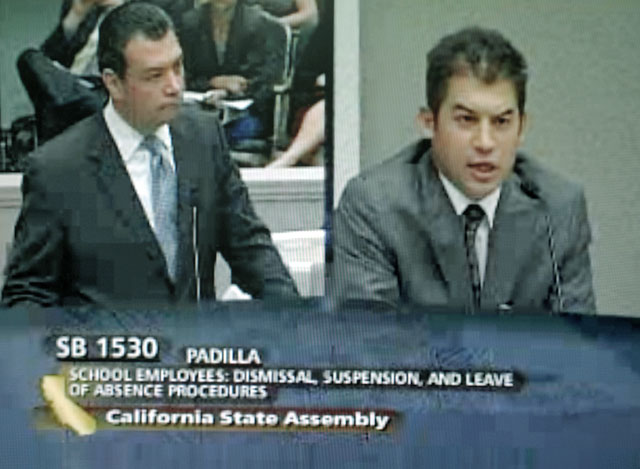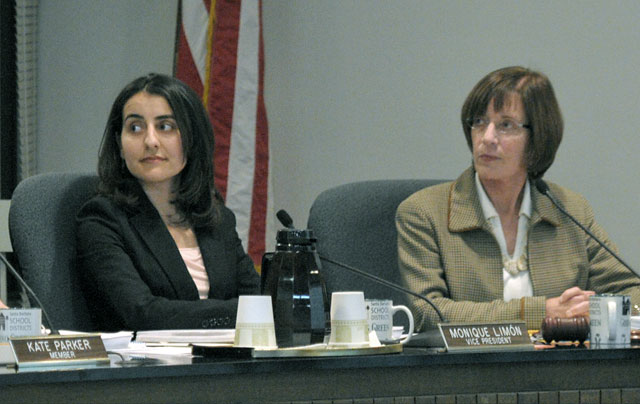Is Das Williams a Teachers’ Pet?
Assemblymember Must Balance Reform and Labor

At the end of June, an obscure bill died in the State Assembly Education Committee. Senate Bill 1530 would have made it easier to fire teachers accused of sexual, violent, or drug-related misconduct. That 35th District Assemblymember Das Williams, along with three other Democrats on the committee, abstained from voting, thereby keeping the bill one “aye” away from passage, meant it was about to get lost among the legislative archives.
But last week, CNN aired a segment on Anderson Cooper 360, in which a reporter for the program hosted by the dashing Anderson Cooper marched into the State Capitol and demanded the abstainers explain their non-votes. The gist of the story was that Williams and his colleagues abstained because a “no” vote would anger the public and a “yes” vote would anger the unions that have contributed nearly $30,000 to his campaigns since 2009.
The bill in question was introduced by Democratic Senator Alex Padilla, who represents the San Fernando Valley. He wrote the bill as a direct response to the case of L.A. Unified elementary school teacher Mark Berndt, who allegedly bound, gagged, and fed semen to students ages 7-10. To get rid of Berndt, the district settled with the teacher in the amount of $40,000 instead of engaging in the long and arduous dismissal process.
For a subset of especially egregious crimes, Padilla’s bill would streamline that process. Specifically, it would end a summer moratorium for issuing notices of dismissal, end a four-year statute of limitations on evidence gathered in investigations and presented in dismissal proceedings, and allow teachers accused of violent, sexual, or drug-related crimes to be put on unpaid (as opposed to paid) leave.
The biggest sticking point, however, is that the law would transfer the power to dismiss a teacher from a Commission on Professional Competence (CPC) to a district’s school board. Currently, CPCs are composed of an administrative law judge, a member selected by the accused teacher, and a member selected by the school board. Under Padilla’s proposed law — which is likely dead and will have to be reintroduced in the next legislative session — only the judge would hear a case, and his or her ruling would merely be advisory to the school board’s final decision.
The California Teachers Association (CTA), a statewide union, opposes the bill on the grounds that it “guts” due process, as local union chief Layne Wheeler put it, and that had L.A. Unified followed proper reporting protocol, Berndt would have been caught and dismissed years earlier.

Williams explained that a “no” would indicate an unwillingness to negotiate. While he felt that SB 1530 “overreached,” he is not opposed to portions of the bill. Specifically, he wrote in a letter he posted on the website Edhat, “I did agree with the intention of the bill and many aspects that were included in the original language, such as permitting evidence more than 4 years old to be considered in the dismissal proceedings and allowing dismissal to take place at any time of the year, including summers.” Williams supported an earlier bill — AB 2028 — that would have instituted those changes.
At the Education Committee hearing in June, he said that he appreciated the intention of the bill, and went on, “We want to take efforts to improve the system of teachers that engage in criminal acts. I do have some concerns about changes in the CPC. I do think that in cases of violence, the wisdom of having a teacher involved in the dismissal procedure is important.” He was especially concerned that a teacher breaking up a fight might be subject to removal for violence and thinks that a CPC with teacher representation would help ward off that danger, a concern he related both to The Santa Barbara Independent and in his Edhat letter.
In response to that scenario, Santa Barbara school board president Susan Deacon said, “The district should be the first decider about when a teacher crosses a line.” She said she felt there was a lot of disappointment in the educational community that SB 1530 did not make it onto the Assembly floor. Schools superintendent David Cash said he thought the bill would have been a “slam dunk.”
Ironically, while CNN framed the battle over SB 1530 as a failed effort to put a dent in the CTA’s inarguable influence Padilla is not exactly a union buster. According to the same website that CNN used to calculate teacher-union contributions to Williams’s campaign — maplight
.org — Padilla is also a top recipient of teaching union money, having received $19,600 between May 20, 2008 and May 19, 2012.
While SB 1530 is almost definitely not going to make it to the governor’s desk by this Friday’s legislative deadline, another education reform bill is alive and kicking. AB 5, which was introduced by 39th District Assemblymember Felipe Fuentes, would establish a statewide framework for teacher evaluations. The bill made it through the Appropriations Committee last Thursday when Fuentes found $89 million to fund it. S.B. school boardmember Monique Limón still worries that isn’t enough to cover the law’s implementation, and the district is already saddled with several unfunded state mandates.
Wheeler explained CTA’s support for the bill: “Every local school district is like a little community. They have specific needs based on their student population and demographics which shape the work of teachers. The local educators, parents, and administrators know what’s best for their students. AB 5 recognizes this distinction and continues the practice of collectively bargaining any evaluation system at the local level to ensure the buy-in and trust of all affected parties and to ensure local conditions and student needs are considered.”
Local collective bargaining is what bothers Cash, who said he sent a note to Williams urging a “no” vote. “You will have 1,000 different districts bargaining,” he said. “What does that mean? … What’s good in Goleta should be good in Montecito.” Fuentes’s deputy chief of staff, Ben Golombek, countered that almost every district collectively bargains their evaluation systems. “We’re creating a floor for the minimums of what we think should be in a teacher evaluation,” he said.
The biggest point of debate is what role standardized testing should play in the evaluation system. How far the law goes in that regard will bear on whether the state qualifies for a waiver freeing up an extra 350 million federal dollars. An amendment on Thursday mandated the inclusion of testing in evaluations but still leaves the details up to local districts. Williams indicated that he is wary of the bill. He believes test scores should play a meaningful role in evaluations but not one that overwhelms other important factors like student progress, peer feedback, and observations. Test scores are not included in Santa Barbara teacher evaluations, although administrators do consider them informally in order to assess and support their staffs.



